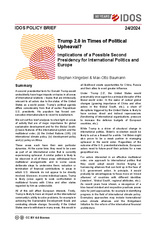Policy Brief
Trump 2.0 in times of political upheaval? Implications of a possible second presidency for International politics and Europe
Klingebiel, Stephan / Max-Otto BaumannPolicy Brief (24/2024)
Bonn: German Institute of Development and Sustainability (IDOS)
DOI: https://doi.org/10.23661/ipb24.2024
Dt. Ausg. u.d.T.:
Trump 2.0 in einer Zeit globaler Umbrüche? Implikationen einer möglichen erneuten Präsidentschaft für die internationale Politik und Europa
(Policy Brief 19/2024)
A second presidential term for Donald Trump would undoubtedly have huge impacts on topics in all areas of international relations – topics that are intrinsically relevant to all actors due to the status of the United States as a world power. Trump’s political agenda differs considerably from that of earlier Republican U.S. presidents. His populism has forced con-servative internationalism to revert to isolationism.
We set out five brief analyses to shed light on areas of activity that are of major importance for global sustainable development and for the Global South: (i) basic features of the international system and the multilateral order, (ii) the United Nations (UN), (iii) international climate policy, (iv) development policy and (v) policy on Africa. These areas each have their own particular dynamics. At the same time, they need to be seen as part of an international order that is currently experiencing upheaval. A similar pattern is likely to be observed in all of these areas: withdrawal from multilateral arrangements and in some cases deliberate steps to undermine them; reduction or termination of financial contributions in areas in which U.S. interests do not appear to be directly involved. Moreover, in some individual cases, Trump is likely (once again) to seek confrontation in multilateral forums with China and other states regarded by him as undesirable.
All of this will affect European interests. Firstly, Trump is likely to have an impact on the international community’s ability to solve problems, for example in achieving the Sustainable Development Goals and combating climate change. Secondly, if the United States were to withdraw in many areas, this would in all likelihood create opportunities for China, Russia and their allies to exert greater influence.
Under ‘Trump 2.0’, the United States would presumably once again be a principal disruptor of the liberal world order. In the wake of radical global changes (growing importance of China and other actors in the Global South, etc.), a chain of disruptions triggered by the United States is likely to have serious direct and indirect repercussions (functioning of international organisations; pressure to increase the defence budgets of European countries, etc.).
While Trump is a driver of structural change in international politics, Biden’s re-election would be likely to act as a firewall for a while. Yet Biden might also prove to be a weak partner in managing upheaval in the world order. Regardless of the outcome of the U.S. presidential elections, European actors need to future-proof their policies for a new geopolitical era. For actors interested in an effective multilateral order, one approach to international politics that they could adopt would involve forging or harnessing alliances that can hold up in the face of U.S. government action. In principle, it would probably be advantageous to focus more on ‘mixed alliances’ of countries with different identities (‘western’, ‘Global South’, regional attributes, etc.). As recent years have shown, a resurgence of a bloc-based mindset and respective practices poses risks for joint approaches, for example in identifying progress in the field of international climate policy. Exemplary approaches may include transnational urban climate alliances and the Bridgetown Initiative for the reform of the international financial architecture.
Kontakt
Cornelia Hornschild
Koordinatorin Publikationen
E-Mail Cornelia.Hornschild@idos-research.de
Telefon +49 (0)228 94927-135
Fax +49 (0)228 94927-130
Alexandra Fante
Bibliothekarin/Open Access-Koordinatorin
E-Mail Alexandra.Fante@idos-research.de
Telefon +49 (0)228 94927-321
Fax +49 (0)228 94927-130





